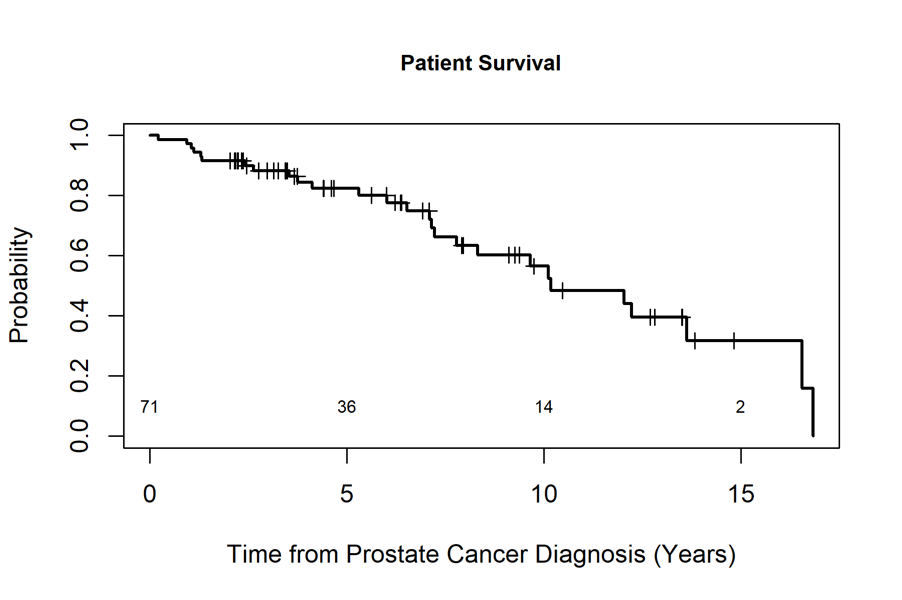Back
Poster, Podium & Video Sessions
Moderated Poster
MP36: Renal Transplantation & Vascular Surgery
MP36-06: Characteristics and outcomes of de novo prostate cancer in the solid organ transplant population at the University of Minnesota
Sunday, May 15, 2022
7:00 AM – 8:15 AM
Location: Room 228
Brent Cleveland*, Andrew Gardeck, Matthew Holten, Scott Jackson, Timothy Pruett, Christopher Warlick, Minneapolis, MN
- BC
Brent E. Cleveland, MD
Urology Resident
University of Minnesota
Poster Presenter(s)
Introduction: Prior research suggests genitourinary malignancies occur at a higher incidence in solid organ transplant (SOT) population compared to the general population but the incidence of prostate cancer is not increased. Most studies examining prostate cancer in the transplant population consist of small cohorts and are limited to renal transplant recipients. We aim to expand our knowledge of the characteristics and outcomes of de novo prostate cancer diagnosed in a large single-center SOT cohort.
Methods: The University of Minnesota SOT database was queried for recipients who subsequently developed prostate cancer from 1984-2019. Available records were reviewed for clinical characteristics and outcomes. Descriptive statistics, frequencies, and Kaplan Meier survival estimates were calculated.
Results: Approximately 10,888 SOTs were performed during this timeframe. Of these, 139 had diagnosis code of prostate malignancy, of which 71 had confirmed diagnosis and available records. These men were predominantly Caucasian (94.4%) with a mean age at first transplant of 54.4 (±10.3) years and mean age at cancer diagnosis of 64.5 (±7.2) years. The most common transplant types were kidney (43.7%), heart (28.2%), and liver (14.1%). Median PSA at diagnosis was 7.2 ng/mL (range 1.1-91.3). Grade group 1 disease (32.4%) was most common at initial diagnosis, followed by groups 2 (23.9%) and 5 (14.1%). The distribution of initial treatments were: prostatectomy (38%), hormonal therapy (22.5%), surveillance (14.1%), radiation (8.5%), brachytherapy (4.2%), and cryotherapy (4.2%). At last known follow up, 25 patients had died (35.2%) with mean age of death of 72.4 (±7.1) years, mean time from transplant to death of 12.5 (±6.5) years, and mean overall survival after initial cancer diagnosis of 11.0 (±23.1) years. Two (2.8%) patients died from prostate cancer. Overall survival estimates at 5 and 10 years from initial cancer diagnosis were 82.4% and 56.5%, respectively. Prostate cancer specific survival was 96.2% at 5 and 10 years.
Conclusions: This investigation of de novo prostate cancer in the largest single-center SOT cohort to date revealed clinical characteristics and survival in SOT recipients were similar to the non-transplant population for men diagnosed with localized disease.
Source of Funding: None

Methods: The University of Minnesota SOT database was queried for recipients who subsequently developed prostate cancer from 1984-2019. Available records were reviewed for clinical characteristics and outcomes. Descriptive statistics, frequencies, and Kaplan Meier survival estimates were calculated.
Results: Approximately 10,888 SOTs were performed during this timeframe. Of these, 139 had diagnosis code of prostate malignancy, of which 71 had confirmed diagnosis and available records. These men were predominantly Caucasian (94.4%) with a mean age at first transplant of 54.4 (±10.3) years and mean age at cancer diagnosis of 64.5 (±7.2) years. The most common transplant types were kidney (43.7%), heart (28.2%), and liver (14.1%). Median PSA at diagnosis was 7.2 ng/mL (range 1.1-91.3). Grade group 1 disease (32.4%) was most common at initial diagnosis, followed by groups 2 (23.9%) and 5 (14.1%). The distribution of initial treatments were: prostatectomy (38%), hormonal therapy (22.5%), surveillance (14.1%), radiation (8.5%), brachytherapy (4.2%), and cryotherapy (4.2%). At last known follow up, 25 patients had died (35.2%) with mean age of death of 72.4 (±7.1) years, mean time from transplant to death of 12.5 (±6.5) years, and mean overall survival after initial cancer diagnosis of 11.0 (±23.1) years. Two (2.8%) patients died from prostate cancer. Overall survival estimates at 5 and 10 years from initial cancer diagnosis were 82.4% and 56.5%, respectively. Prostate cancer specific survival was 96.2% at 5 and 10 years.
Conclusions: This investigation of de novo prostate cancer in the largest single-center SOT cohort to date revealed clinical characteristics and survival in SOT recipients were similar to the non-transplant population for men diagnosed with localized disease.
Source of Funding: None


.jpg)
.jpg)